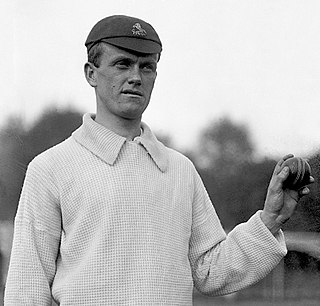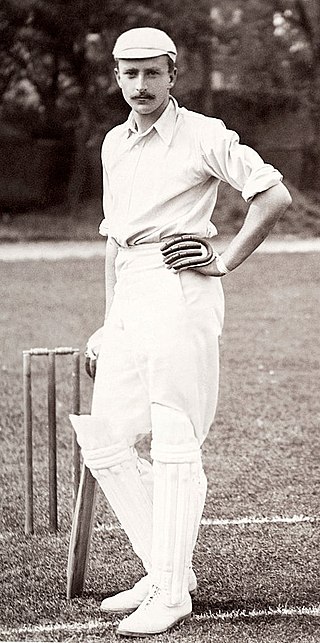First-class cricket, along with List A cricket and Twenty20 cricket, is one of the highest-standard forms of cricket. A first-class match is one of three or more days' scheduled duration between two sides of eleven players each and is officially adjudged to be worthy of the status by virtue of the standard of the competing teams. Matches must allow for the teams to play two innings each, although in practice a team might play only one innings or none at all.

Hedley Verity was a professional cricketer who played for Yorkshire and England between 1930 and 1939. A slow left-arm orthodox bowler, he took 1,956 wickets in first-class cricket at an average of 14.90 and 144 wickets in 40 Tests at an average of 24.37.

Colin Blythe, also known as Charlie Blythe, was an English professional cricketer who played Test cricket for the England cricket team during the early part of the 20th century. Blythe was a Wisden Cricketer of the Year in 1904 and took more than 2,500 first-class wickets over the course of his career, one of only 13 men to have done so.

Arthur Webb Mold was an English professional cricketer who played first-class cricket for Lancashire as a fast bowler between 1889 and 1901. A Wisden Cricketer of the Year in 1892, he was selected for England in three Test matches in 1893. Mold was one of the most effective bowlers in England during the 1890s but his career was overshadowed by controversy over his bowling action. Although he took 1,673 wickets in first-class matches, many commentators viewed his achievements as tainted.

Frank Edward Woolley was an English professional cricketer who played for Kent County Cricket Club between 1906 and 1938 and for the England cricket team. A genuine all-rounder, Woolley was a left-handed batsman and a left-arm bowler. He was an outstanding fielder close to the wicket and is the only non wicket-keeper to have held over 1,000 catches in a first-class career, whilst his total number of runs scored is the second highest of all time and his total number of wickets taken the 27th highest.
The Association of Cricket Statisticians and Historians (ACS) was founded in England in 1973 for the purpose of researching and collating information about the history and statistics of cricket. Originally called the Association of Cricket Statisticians, the words "and Historians" were added in 1992 but it has continued to use the initialism ACS.

Bransby Beauchamp Cooper was a member of the Australian cricket team that played the inaugural Test match at the Melbourne Cricket Ground in 1877. Cooper was born in Dacca in what was then British India in 1844. He played first-class cricket as an amateur in England for Middlesex and Kent County Cricket Clubs before moving to Australia where he played for Victoria cricket team. He was a right hand batsman and wicket-keeper and the first Indian-born cricketer to play Test cricket.
This is a bibliography of literary and historical works about cricket. The list is sorted by author's name. It is inevitably highly selective. The 1984 edition of E. W. Padwick's A Bibliography of Cricket had more than 10,000 entries.

The 1744 cricket season in England is remembered for the earliest known codification of the Laws of Cricket. This was drafted by members of several cricket clubs, though the code was not published until 1755. Much of its terminology such as no ball, over, toss, umpire and wicket remain in current use. The season is also notable for the two earliest known surviving match scorecards. The second of those matches, played on Monday, 18 June, was a celebrated event in which a Kent county team challenged an England team at the Artillery Ground, Kent winning by one wicket.
Variations in published cricket statistics have come about because there is no official view of the status of cricket matches played in Great Britain prior to 1895 or in the rest of the world prior to 1947. As a result, historians and statisticians have compiled differing lists of matches that they recognise as (unofficially) first-class. The problem is significant where it touches on some of the sport's first-class records, especially in regards to the playing career of W. G. Grace.

Charles Augustus Ollivierre was a Vincentian cricketer who represented the West Indies in matches before they attained Test match status. Born in St Vincent, Ollivierre initially played first-class cricket for Trinidad; he was selected to tour England with the West Indies team in 1900. He later qualified to play first-class cricket for Derbyshire between 1901 and 1907, becoming the first black West Indian to play for an English county. Ollivierre was reasonably successful in county cricket and had a reputation as a stylish batsman. However, he dropped out of first-class cricket after 1907 owing to eye trouble.

Cricket: A Weekly Record of the Game was a British cricket magazine, published in London, which ran from 1882 to 1913. It has often been referenced as just Cricket.

Eric William Mann was an English cricketer and philatelist who signed the Roll of Distinguished Philatelists in 1947. He was President of the Royal Philatelic Society London between 1946 and 1949. Mann was an expert on the stamps of Natal and Tasmania.
Alan Lake Hilder was an English amateur cricketer who played first-class cricket between 1924 and 1930. He played primarily for Kent County Cricket Club. He was born in Beckenham, then part of Kent, in 1901.
Reginald Sydney Habershon Baiss was an English cricketer who played first-class cricket for Oxford University and Kent County Cricket Club between 1895 and 1901. He was born at Belvedere, Kent and died at Tunbridge Wells.
Edward Henty was an English first-class cricketer who played for Kent County Cricket Club as a professional between 1865 and 1881. He was born in Hawkhurst in Kent and died at Lewisham in 1900 aged 60.
William John Banks was a Welsh-born English amateur cricketer who played first-class cricket for Kent County Cricket Club and the amateur Gentlemen of Kent teams in the 1840s. He was born at Swansea and died at Oxney Court near Dover in Kent.

Charles John MacDonald Fox was an English cricketer. He played 80 first-class matches, mainly for Kent County Cricket Club, in a career that lasted from 1876 until 1893. A heavy scorer in club cricket, Fox played as an all-rounder in county cricket.
John Arthur Deed was an English amateur cricketer who played for Kent County Cricket Club between 1924 and 1930. He was born in Sevenoaks in Kent in 1901.










